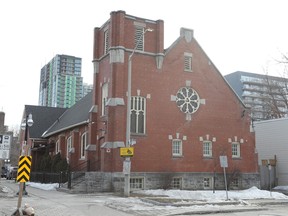
The plan is to de-list almost all the properties on the city’s heritage register, then re-list priority properties in January.

Article content
The city’s built heritage committee has approved a convoluted manoeuvre to protect priority properties from demolition in the face of new provincial legislation aimed at building more homes faster.
Building new homes sometimes means demolishing old buildings. The Ford government’s Bill 23 has set a tight timeline for designating properties under the Ontario Heritage Act.
Advertisement 2
Article content
Article content
The bill also aims to shrink municipal heritage registers. Ottawa has the province’s largest register with 4,600 properties listed.
Under Bill 23, properties can only be on a heritage register for two years. If a municipal council doesn’t issue a notice of intention to designate a property that’s on their city register under the Heritage Act by the end of 2024, the property must be removed from the register — and it can’t be re-listed for five years.
That’s a concern for Ottawa heritage advocates. Being on the municipal register offers a measure of protection for properties that have not been designated heritage, but are still of interest. If a property owner wishes to demolish a building on the register, the city has 60 days to decide whether to protect the building from demolition by designating it under the Heritage Act.
The convoluted plan approved Tuesday involves removing almost all of the 4,600 properties from the city register by the end of the year in batches, then re-listing a couple dozen of the top-priority properties in January. All of the 465 properties approved for de-listing on Tuesday were in rural areas and the outer suburbs, but they will be followed by thousands more from other parts of the city in the next few months.
Advertisement 3
Article content
About 700 Ottawa properties have been identified as potential candidates for designation, said Lesley Collins, the city’s program manager for heritage planning. She anticipates there will likely be fewer than 100 properties left on the register at the end of the year.
“We have to take them off (the register) because that’s what the legislation says we do,” she said. “But that doesn’t mean we’re not going to keep working through that list of 700. They just won’t have interim protection in the meantime.”
The de-listing and re-listing strategy will give heritage planners a bit of extra time, said David Flemming, chair of Heritage Ottawa’s advocacy committee.
“Most of them (buildings on the heritage register) will never be developed. It’s a way of dealing with this overwhelming job heritage planners face.”
Heritage planners will bring forward a report on heritage conservation districts this spring, with the goal of approving at least one new district, said Collins.
“We might look at listing all of the properties (on the heritage register) within that study area to provide interim protection while we’re undertaking that study.”
Advertisement 4
Article content
The city will also maintain an interim register containing all of the 4,600 properties so members of the public and property owners who are interested can access information such as when a listed property was built, who built it and other historical information.
“When the register was created through the heritage inventory project, we collected a vast amount of data about these properties,” said Collins. “We don’t want that to go to waste, because we think it’s very interesting and useful data for the public to have access to.”
De-listing and re-listing properties will create work for staff. It’s frustrating, but necessary, said Rideau-Rockcliife Coun. Rawlson King, the chair of the built heritage committee.
“It’s an innovative way to respond to the legislative changes that we’ve seen around Bill 23. And it’s a made-in-Ottawa solution that ensures that at least we retain the information.”
Meanwhile, city staff aim to designate between 25 and 30 individual properties under the Heritage Act before the end of the year — about five or six times the usual number.
It will not be a smooth process. The committee has already approved designating six properties last month and was set Tuesday to discuss designating a seventh building, Église évangélique baptiste, a late Gothic revival church at the intersection of King Edward Avenue and Clarence Street, built between 1904 and 1920.
Advertisement 5
Article content
Making a decision on that matter has been deferred until next month. Representatives from the church were at the meeting, prepared to outline their objections to heritage designation for the church, which the congregation wants to sell in order to open a larger church in the west end.
“Keeping the church as some sort of monument to the past is unrealistic,” said Gordon Belyea, a retired associate pastor at the church.
“It’s 100 years old and we’ve (spent) hundreds of thousands of dollars just to keep it standing. If they designate it, we’re stuck with it.”
The plan will be before city council on Feb. 21.
Recommended from Editorial
Article content

